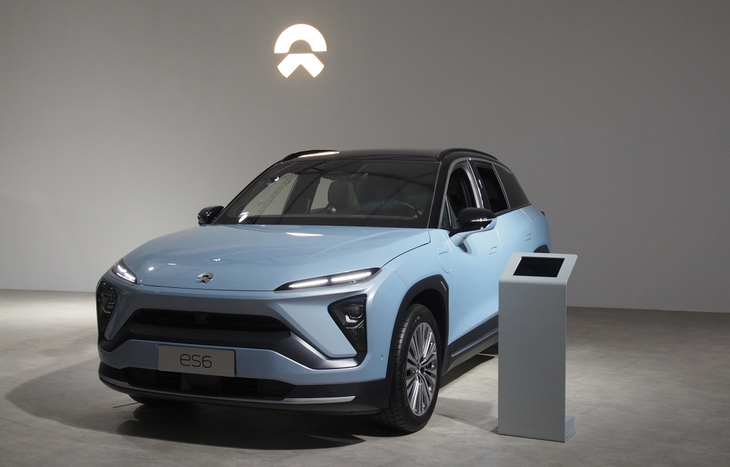Top 5 Chinese EV Stocks to Buy Now
Tesla remains one of the most popular EV makers in the world. It stands as the only automaker specializing in EVs in the US. While legacy automakers in the US are starting to produce EVs, Tesla is the only major automaker focusing exclusively on EVs.
But if you fly from California across the Pacific to China, you find a very different situation. In China, several EV startups are appearing. China has become the manufacturing capital of the world, but that doesn’t entirely explain why so many companies there are making EVs. The Chinese government is promoting greener vehicles. This has played a big part in the increase in EV manufacturing.
Here, we’ll take a look at some of those new EV makers. Despite being new, many of them look promising. Without further ado, here are five of the best Chinese EV stocks to buy:

- NIO (NYSE: NIO)
- BYD Company (OTC: BYDDF)
- XPeng Inc. (NYSE: XPEV)
- Niu Technologies (NYSE: NIU)
- Li Auto Inc. (Nasdaq: LI)
Are Chinese EV Stocks a Good Investment?
China has the most EVs in the world with 4.5 million vehicles. That’s if you include plug-in hybrid electric vehicles (PHEVs). While the total share of electric vehicles in China is much smaller than in countries like Norway, several Chinese electric vehicle makers are scaling up.
And unlike Teslas, many Chinese EVs are incredibly affordable. In fact, one Chinese EV starts at under $5,000, and several others are priced around $10,000. These ultra-cheap EVs are outselling Tesla cars. With such low price tags, Chinese EV manufacturers should have no problem selling plenty of cars.
China’s government is pushing for electric vehicles. And the country’s EV manufacturers are seeing consistent revenue and profit growth. Chinese EV stocks look like a strong investment going forward.
Best Chinese EV Stocks to Buy Today
Now, let’s take a closer look at some of the best Chinese EV stocks to consider adding to your portfolio. After this list, you might also be interested in these top EV charging station stocks.
NIO
NIO stock is one of the most promising of Chinese EV stocks. Not only is its revenue and profit moving in the right direction; so, too, is its vehicle deliveries. It delivered 10,628 vehicles globally in September 2021. That figure is a 125.7% increase year-over-year. Its three-month output is 24,439, and the total deliveries of its ES8, ES6 and EC6 vehicles are 142,036 as of September 2021.
NIO’s net income for the quarter ending June 2021 was ¥-659.28 million. Negative numbers are not ideal and last quarter, it was ¥-4.87 billion. Nonetheless, NIO is growing and it’s close to breaking even now. Its revenue has continued to grow every quarter.
BYD Company
BYD stands for “build your dreams” and one could argue that is a good slogan for the broad Chinese EV market. However, BYD makes internal combustion engine (ICE) vehicles in addition to its electric vehicles. BYD Company has several subsidiaries, including BYD Auto. It has several other subsidiaries including BYD Electronics Co and BYD Toyota EV Technology Co., Ltd. BYD is also involved in rail transit.
BYD is selling huge amounts of vehicles, too. In August 2021, it sold 61,409 so-called “new energy” vehicles, which includes both battery electric vehicles and PHEVs.
BYD is also profitable overall, with a $936 million profit in Q2 2021 and 22% revenue growth year-over-year.
Li Auto
Li Auto is another electric vehicle startup; it was founded in 2015 and began volume production in 2019 with the Li ONE, focusing on the SUV segment. This Chinese EV stock debuted on the Nasdaq in 2020 with close to a $10 billion valuation.
The company delivered 7,094 Li ONEs in September 2021, a year-over-year increase of 102.5%. In total, it has delivered 88,867 Li ONEs since it began production. It has 153 retail stores in 85 cities. Its production capacity is 100,000 vehicles, expandable to 200,000, so there is still much room to grow.
In terms of earnings, its revenue was ¥5.04 billion for Q2 2020, a year-over-year increase of 159%. Its net profit margin was negative at -4.67%, although that is an improvement over its -10.07% profit margin for Q1. In addition, it has over ¥12 billion cash on hand.
XPeng
XPeng has been turning heads with some of its cars, such as the P5, slated to be the first production car with lidar. Lidar is similar to radar but uses light detection and will aid with self-driving technology.
On the delivery front, it reached 10,412 vehicles in September 2021, which was a 199% year-over-year increase and its highest monthly total ever. XPeng only began delivering vehicles in 2018.
XPeng’s revenue increased 537% to ¥3.76 billion, but its net income and profit margin are still in the red. In fact, its net income decreased 718% year-over-year as of Q2; that will be something to keep an eye on going forward.
Niu Technologies
Not to be confused with NIO, Niu Technologies actually sells electric scooters, motorcycles, mopeds and bicycles. Although Niu is obviously not an electric car company, it does sell electric motorcycles and is experiencing rapid growth in both unit sales and profitability.
For instance, it sold 149,649 e-scooters in Q1 2021 which was an increase of 273% year-over-year. Most of its quarters have been profitable recently, with the exception of Q1 2021; however, its net profit margin in that quarter was -0.98% or nearly breakeven. It was back in the green in Q2 2021, when it had a 9.72% net profit margin.
Investing in Chinese EV Stocks and New Technologies
The companies above give investors access to some of the best Chinese EV stocks around. As the industry grows, they should provide solid gains for investors.
As mentioned, you can also check out these EV charging station stocks. They’re outside of China and can help diversify your portfolio. On top of that, you might be interested in these semiconductor stocks. The chip shortage is creating some unique investing opportunities.
If you’re looking for even more investing opportunities, sign up for Liberty Through Wealth below. It’s a free e-letter that’s packed with investing tips and tricks. You’ll hear directly from investing experts such as Alexander Green. He’s also a bestselling author that’s helped hundreds of thousands of readers.
[adzerk-get-ad zone="245143" size="4"]About Bob Haegele
Bob Haegele is a personal finance writer who specializes in investing and planning for retirement. His hefty student loan burden inspired him to pay off his loans, and now he’s helping others get their finances in order. When he’s not writing, he enjoys travel and live music.





